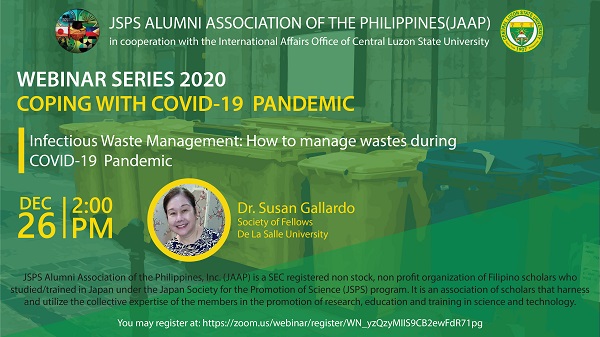เมื่อวันที่ 19 ธันวาคม 2563 มีการจัดบรรยายครั้งที่ 4 ของ WEBINER SERIES 2020 ในหัวข้อ “COPING WITH COVID-19 PANDEMIC” โดยสมาคมศิษย์เก่า JSPS ฟิลิปปินส์ (JAAP) ร่วมมือกับสำนักงานวิเทศสัมพันธ์ของมหาวิทยาลัย Central Luzon State

การบรรยายเริ่มด้วยการกล่าวคำปราศรัยต้อนรับโดยดร. Danilda Hufana-Duran ประธานสมาคมศิษย์เก่า JSPS ฟิลิปปินส์ (JAAP)
ตามด้วยคำกล่าวของดร. Edgar A. Orden อธิการบดีมหาวิทยาลัย Central Luzon State และดร. Yoshio Otani ผู้อำนวยการ JSPS ประจำสำนักงานกรุงเทพฯ
จากนั้น ดร. Susan M. Gallardo มหาวิทยาลัย De La Salle ได้บรรยายเรื่อง “Infectious Waste Management: How to manage wastes during COVID-19 Pandemic.”
สำหรับการบรรยายครั้งนี้มีผู้เข้าร่วมประมาณ 60 คน และมีคำถามมากมายหลังการนำเสนอ
โดยเฉพาะผู้ดำเนินรายการ ดร. C. Deocaris กล่าวว่า สมาคมศิษย์เก่า JSPS ฟิลิปปินส์ (JAAP) ควรเป็นผู้นำรัฐบาลฟิลิปปินส์ในสาขานี้ และมีโอกาสมากมายในการเริ่มต้นธุรกิจใหม่ๆ
สุดท้ายดร. Rowena Eguia รองประธานสมาคมศิษย์เก่า JSPS ฟิลิปปินส์ (JAAP) กล่าวปิดงาน และขอบคุณทุกคนที่เข้าร่วมงานในครั้งนี้

Dr. Susan M. Gallardo
Society of Fellows De La Salle University
【Abstract of the Lecture】
Health-care waste includes all the waste generated by health-care establishments, research facilities, and laboratories. 10-25% of health-care waste is regarded as hazardous and may create a variety of health risks. Infectious waste is waste suspected to contain pathogens (bacteria, viruses, parasites, or fungi) in sufficient concentration or quantity to cause disease in susceptible hosts.
The main legislation of the Philippine government with regards to hazardous waste management is RA 6969. It is otherwise known as “Toxic Substances and Hazardous and Nuclear Waste Control Act of 1990”. The law was enacted to protect the public and the environment from the risk or potential dangers in the use or exposure to chemicals, from long- term damage brought about by careless handling or disposal of hazardous wastes; and to regulate the use, movement and disposal of chemicals, hazardous and nuclear wastes in the country.
The COVID-19 pandemic is continuing to have an impact on the country’s healthcare system as well as in waste management system. There are increased volumes of discarded materials from health protection activities, medical diagnosis, treatment and scientific research. Safe and efficient disposal of this medical waste is a critical component of a comprehensive response effort.
How the government and the private sector (healthcare facilities) have responded to these challenges is discussed in this lecture. The Environment Management Bureau (EMB) of the Department of Environment and Natural Resources (DENR) has issued several Memorandum Circulars to facilitate the on-line registration of generators, transporters, storage, treatment and disposal facilities.
Lastly, partial results of a survey on the healthcare facility’s infectious waste management before and during COVID-19 Pandemic will be included.








